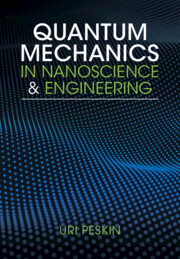Book contents
- Quantum Mechanics in Nanoscience and Engineering
- Additional material
- Quantum Mechanics in Nanoscience and Engineering
- Copyright page
- Contents
- Preface: Who Can Benefit from Reading This Book?
- 1 Motivation
- 2 The State of a System
- 3 Observables and Operators
- 4 The Schrödinger Equation
- 5 Energy Quantization
- 6 Wave Function Penetration, Tunneling, and Quantum Wells
- 7 The Continuous Spectrum and Scattering States
- 8 Mechanical Vibrations and the Harmonic Oscillator Model
- 9 Two-Body Rotation and Angular Momentum
- 10 The Hydrogen-Like Atom
- 11 The Postulates of Quantum Mechanics
- 12 Approximation Methods
- 13 Many-Electron Systems
- 14 Many-Atom Systems
- 15 Quantum Dynamics
- 16 Incoherent States
- 17 Quantum Rate Processes
- 18 Thermal Rates in a Bosonic Environment
- 19 Open Quantum Systems
- 20 Open Many-Fermion Systems
- Index
- References
20 - Open Many-Fermion Systems
Published online by Cambridge University Press: 11 May 2023
- Quantum Mechanics in Nanoscience and Engineering
- Additional material
- Quantum Mechanics in Nanoscience and Engineering
- Copyright page
- Contents
- Preface: Who Can Benefit from Reading This Book?
- 1 Motivation
- 2 The State of a System
- 3 Observables and Operators
- 4 The Schrödinger Equation
- 5 Energy Quantization
- 6 Wave Function Penetration, Tunneling, and Quantum Wells
- 7 The Continuous Spectrum and Scattering States
- 8 Mechanical Vibrations and the Harmonic Oscillator Model
- 9 Two-Body Rotation and Angular Momentum
- 10 The Hydrogen-Like Atom
- 11 The Postulates of Quantum Mechanics
- 12 Approximation Methods
- 13 Many-Electron Systems
- 14 Many-Atom Systems
- 15 Quantum Dynamics
- 16 Incoherent States
- 17 Quantum Rate Processes
- 18 Thermal Rates in a Bosonic Environment
- 19 Open Quantum Systems
- 20 Open Many-Fermion Systems
- Index
- References
Summary
We introduce a kinetic theory of electron transport on the nanoscale, formulated in terms of the Fock space of an open many-electron system, and the “second quantization” Hamiltonian. To model a thermal electron reservoir (e.g., a metal electrode), the Fermi–Dirac distribution is derived from the corresponding density operator. A nanoscale system, weakly coupled to the reservoir, is modeled as an impurity. When the Born–Markov and secular approximations are valid, quantum master equations are derived, showing that the impurity equilibrates with the reservoir. To account for charge transport through the impurity, as in atomic point contacts or single molecule junctions, the master equations are generalized for cases of an impurity coupled to different reservoirs at different chemical potentials/temperatures. In these cases, we show that the system reaches a nonequilibrium steady state, where current flows through the impurity. Analytic expressions are derived for this steady state in simple models.
Keywords
- Type
- Chapter
- Information
- Quantum Mechanics in Nanoscience and Engineering , pp. 431 - 472Publisher: Cambridge University PressPrint publication year: 2023

